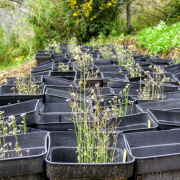Moi’s paper on flowering time under global change published
Spatio-temporal variation in fitness responses to contrasting environments in Arabidopsis thaliana
Exposito-Alonso et al., Evolution (2018)
The evolutionary response of organisms to global climate change is expected to be strongly conditioned by preexisting standing genetic variation. In addition, natural selection imposed by global climate change on fitness-related traits can be heterogeneous over time. We estimated selection of life-history traits of an entire genetic lineage of the plant Arabidopsis thaliana occurring in north-western Iberian Peninsula that were transplanted over multiple years into two environmentally contrasting field sites in southern Spain, as southern environments are expected to move progressively northwards with climate change in the Iberian Peninsula. The results indicated that natural selection on flowering time prevailed over that on recruitment. Selection favored early flowering in six of eight experiments and late flowering in the other two. Such heterogeneity of selection for flowering time might be a powerful mechanism for maintaining genetic diversity in the long run. We also found that north-western A. thaliana accessions from warmer environments exhibited higher fitness and higher phenotypic plasticity for flowering time in southern experimental facilities. Overall, our transplant experiments suggested that north-western Iberian A. thaliana has the means to cope with increasingly warmer environments in the region as predicted by trends in global climate change models.




